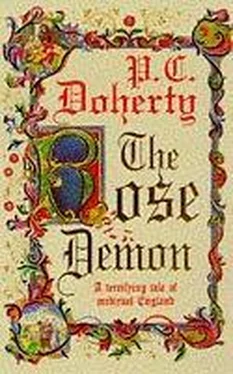Paul Doherty - The Rose Demon
Здесь есть возможность читать онлайн «Paul Doherty - The Rose Demon» весь текст электронной книги совершенно бесплатно (целиком полную версию без сокращений). В некоторых случаях можно слушать аудио, скачать через торрент в формате fb2 и присутствует краткое содержание. Жанр: Исторический детектив, на английском языке. Описание произведения, (предисловие) а так же отзывы посетителей доступны на портале библиотеки ЛибКат.
- Название:The Rose Demon
- Автор:
- Жанр:
- Год:неизвестен
- ISBN:нет данных
- Рейтинг книги:5 / 5. Голосов: 1
-
Избранное:Добавить в избранное
- Отзывы:
-
Ваша оценка:
- 100
- 1
- 2
- 3
- 4
- 5
The Rose Demon: краткое содержание, описание и аннотация
Предлагаем к чтению аннотацию, описание, краткое содержание или предисловие (зависит от того, что написал сам автор книги «The Rose Demon»). Если вы не нашли необходимую информацию о книге — напишите в комментариях, мы постараемся отыскать её.
The Rose Demon — читать онлайн бесплатно полную книгу (весь текст) целиком
Ниже представлен текст книги, разбитый по страницам. Система сохранения места последней прочитанной страницы, позволяет с удобством читать онлайн бесплатно книгу «The Rose Demon», без необходимости каждый раз заново искать на чём Вы остановились. Поставьте закладку, и сможете в любой момент перейти на страницу, на которой закончили чтение.
Интервал:
Закладка:
31
‘Three whores have been murdered in the last month.’
The Castilian captain knelt down and covered the corpse of a sallow-skinned girl, her black hair spread out like a fan around her head. The sheet was dirty but at least it protected her from the flies which, despite winter, still plagued the great Catholic army outside the Moorish city of Granada.
Matthias murmured a prayer and walked back along the street, past the stables which could house a thousand horses and on to the edge of the great no man’s land, the Vega, brown-scorched earth which stretched from the camp of Ferdinand and Isabella up to the soaring walls and formidable gates of Granada. Matthias fought to control his own thoughts. He looked up at the city: above its soaring, rambling walls rose the Alhambra, the great Moorish palace, a place of mystery and power in the centre of the city. Matthias had heard the stories about its stately gardens and arching fountains, its intricate mosaic rooms and beautifully tiled floors; its chambers which seemed to open endlessly from one sun-filled courtyard to another. Beyond Granada, through the early morning mist, rose the snow-capped ridges of the Sierra Nevada.
Matthias sat down, his back to a tree. He and Sir Edgar had been in Spain for almost four months. It was now December 1491. Matthias could hardly believe that he was so far from home, part of a crusading army, tens of thousands of men from Castile, Aragon, Leon, France and the Low Countries. He and Sir Edgar had joined up with another English contingent under Lord Rivers: young men, fired by an ideal, determined to place the silver cross of Castile on the ramparts of Granada and end Moorish power in Spain for ever.
For the first few weeks Matthias had been fascinated. Both King Ferdinand and Queen Isabella had joined the army: he had glimpsed them either riding through the camp or seated on their thrones before the great high altar when solemn Mass was sung on Sundays and Holy Days. Matthias had been caught up in the excitement of this great crusading army. So determined were the Catholic monarchs to take Granada, they had built a small city to house their army, quarrying rock and masonry to build the town of Holy Faith; a potent warning to the Muslims that the besiegers would never give up until Granada was theirs.
Matthias had witnessed the daring deeds, the life and death struggle between the Catholic monarchs and their Moorish enemy. A Muslim champion, Yarfel, had galloped close into the Castilian encampment and hurled his spear at the royal quarters. It bore an insulting and obscene note for Isabella, Queen of Castile. In revenge a Castilian soldier, Puljar, had led fifteen companions through a poorly guarded gate into Granada’s central mosque. The knights had, in whispered voices, rededicated the mosque to the Virgin Mary and left a note, pinned by a dagger to the main door, with the words ‘Ave Maria’ scrawled across it.
Matthias had also become used to the camp’s routine. He and the rest had soon recovered from a turbulent voyage down the Bay of Biscay and the exhausting march from Cadiz across southern Spain to the Catholic camp.
Shortly after All-Hallows, Matthias had heard rumours: young women, whores, camp followers had been found barbarously murdered, their throats pierced, their cadavers drained of blood. Matthias had kept his own counsel, but this morning, the corpse he had just glimpsed had been found where the English had their quarters. One look had convinced Matthias the Rose Demon had returned.
‘Ever the dreamer, eh, Matthias?’
Sir Edgar Ratcliffe stood over him. His face had soon burnt brown under the Spanish sun, his beard and moustache were more luxuriant. Sir Edgar, however, still had the easy charm and good-natured camaraderie which had first attracted Matthias.
‘You saw the whore?’
‘Aye I did,’ Mathias replied.
Sir Edgar sighed and sat down beside him.
‘I knew her.’ He caught Matthias’ sharp glance. ‘Not in the carnal sense.’ Ratcliffe grinned. ‘But she was a merry girl and could dance wildly like a gypsy.’
Matthias nodded and stared across the Vega at the green silver-edged banner floating above the main gateway of Granada. Matthias had wondered if Sir Edgar could be trusted yet. There again, even as late as yesterday, he and the English knight had shared the Sacrament together at a Mass celebrated by Lord Rivers’ chaplain.
‘Are you waiting for him?’ Ratcliffe abruptly asked. ‘It should happen about now.’
Matthias looked back at him, puzzled.
‘Yarfel!’ Ratcliffe exclaimed.
‘Oh yes,’ Matthias nodded. ‘Him! Someone should accept his challenge.’
Matthias studied the heavily fortified postern door built into one of the side towers near the main gate of Granada. Every morning a trumpet would blow and the huge Moorish champion, head protected by a spiked helmet, his chain mail covered by a flapping red cloak, would ride his great black destrier out of Granada and issue his challenge to single combat. This had begun a month earlier. At first the challenge had been quickly accepted. Time and again some knight from the Spanish army had ridden out, pennants snapping bravely on the end of his spear. Each time Yarfel had been victorious. A superb horseman, a skilled swordsman, he had ridden back into Granada with his enemy’s head stuck on his lance. The rules of chivalry forbade a general assault upon him. However, his constant daily mocking and easy victories had so dispirited the Spanish army that Queen Isabella had issued a written order that no one, on pain of death, was to accept the challenge. No one was even to watch when he rode out, but Matthias ignored the decree.
Every morning he came to the same place and studied the Moorish champion: his posture, the way he guided his horse with his knees, the speed with which he lifted his sword and the manner in which his weapons seemed as much part of his body as his arm or leg. Slowly, as each day passed, Matthias began to wonder. He had been accepted by Ratcliffe’s company and enjoyed their lazy comradeship, the good-natured banter of the camp. He was fascinated by Spain, its freezing nights, the searing heat of the day; the gorgeous panoply of the great lords, the sultry-eyed beauty of their women, the heavy wine, the wild stamping dances and that gypsy music which fired the heart and filled the nights with melodious, twanging sounds.
‘A land of rocks and saints,’ Lord Rivers described Spain.
Nevertheless, Matthias never forgot why he was here. As the weeks passed he wondered where his great chivalrous idea would lead him. He had imagined great battles, men storming crenellated walls, bloody hand-to-hand fights. Instead, nothing but the boring routine of the military camp, until Yarfel had come out of the gates and issued his challenge. Matthias had brooded. Was this the place, he wondered, where he would die? In between Granada and the Catholic camp, defending the honour of the Cross and reputation of a Spanish queen?
A shrill trumpet blast stirred him from his reverie. Despite Ferdinand and Isabella’s instructions, knights, squires and soldiers gathered at the gates or climbed on to the parapets of the makeshift walls of their camp. The postern gate in the city walls opened. Another trumpet blast and the Moorish champion rode out. The early morning sun flashed and gleamed on his armour and helmet. His great cloak billowing out behind him, he rode within the bowshot of the Spanish camp and issued his challenges. He spoke in the lingua franca, the patois of the soldiers, calling them cowards, the sons of bitches, women in men’s clothing. He ridiculed Isabella as a yellow-haired strumpet and, punning on her name, called her a new Jezebel, a witch, a virago. The Spanish soldiers returned this abuse with vigour but Yarfel simply laughed as his horse pranced up and down.
Читать дальшеИнтервал:
Закладка:
Похожие книги на «The Rose Demon»
Представляем Вашему вниманию похожие книги на «The Rose Demon» списком для выбора. Мы отобрали схожую по названию и смыслу литературу в надежде предоставить читателям больше вариантов отыскать новые, интересные, ещё непрочитанные произведения.
Обсуждение, отзывы о книге «The Rose Demon» и просто собственные мнения читателей. Оставьте ваши комментарии, напишите, что Вы думаете о произведении, его смысле или главных героях. Укажите что конкретно понравилось, а что нет, и почему Вы так считаете.












